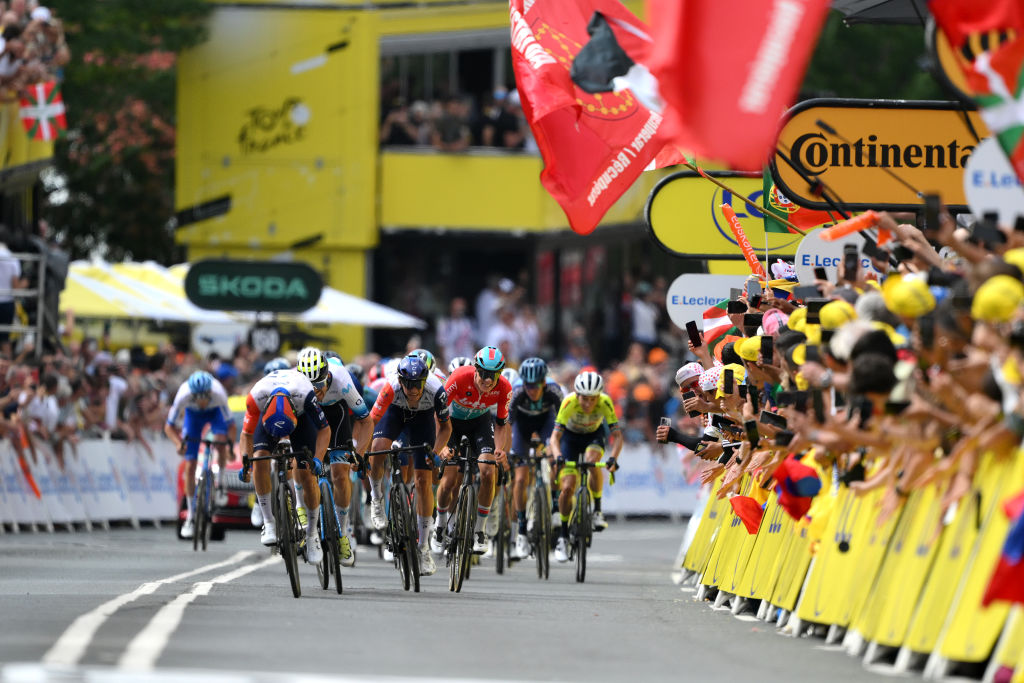Tour de France organisers ASO confirmed that six stages will implement extended distances on finishes for the UCI’s ‘three-kilometre rule’ this year, beginning with two additional kilometres added to the flat run-in on Monday’s stage 3 in Turin, Italy, the first showdown for sprinters across three weeks.
A modification to the ‘sprint zone’ rule, UCI article 2.6.027, commonly called the ‘3km rule’, was formally introduced at the UCI Management Committee meeting in Aigle, Switzerland, in early June to address rider safety at road races.
This rule change was one of four measures recommended by the SafeR project, an independent group responsible for analysing risks and providing safety advice pertaining to UCI WorldTour, Women’s WorldTour and ProSeries races.
During this year’s Tour de France, June 29-July 21, an extension of the sprint zone will be tested at three stages set at four kilometres and three stages set at five kilometres. The 3km rule remains in place for eight total stages, including the two opening days.
“Feedback has shown that the majority of riders wanted the 3km rule extended to reduce stress during hectic race finales,” Hansen said in June.
The original ‘3km rule’ was implemented in 2005, which applies when a rider cannot reach the finish line in that section due to a “duly noted incident”, defined as a fall, mechanical problem or puncture. Previous to 2005, the umbrella distance to negate these types of incidents was just one kilometre.
“In the event of an incident duly noted in the last three kilometers of a straight stage, the rider(s) concerned is (are) credited with the time of the rider(s) in the company of the or where they were at the time of the incident. His (or their) classification will be that of crossing the finish line. There are extensions to 4 km (stages 5, 6 and 10), and to 5 km (stages 3, 12 and 13),” read the amended guideline presented Friday at the Tour de France briefing for team directeurs.
“Runners affected by an incident must immediately make themselves known to a marshal by raising their arm and reporting to a marshal as soon as they cross the finish line.”
The new measure does not apply to the two individual time trials or the five mountain-top finishes, which are clustered across the second and third weeks of the Tour.
“I am extremely happy that @LeTour and @UCI_cycling allows the testing of the extension of the 3km rule to try and create a reduced bunch coming in for the sprint finishes. Good work from SafeR!! One step at a time. We will get there,” was the reaction of CPA President Adam Hansen to twitter.com, who was in attendance at the DS briefing.
The first increase in distance that applies at the end of a stage will be on the third day of racing headed to Turin, where the final five kilometres will be set as a safety net. Monday, the final of three stages in Italy, covers 230.5km across the Po Valley and is the longest stage of the race. After two days with 5,650 metres of elevation gain, the sprint teams are expected to have a field day on the flat finish into the capital of Piedmont.
Get unlimited access to all of our coverage of the Tour de France – including breaking news and analysis reported by our journalists on the ground from every stage of the race as it happens and more. Find out more.
Tour de France 2024 sprint zones
Stages with 3-kilometre rule
- Stage 1 – Florence to Rimini
- Stage 2 – Cesenatico to Bologna
- Stage 4 – Pinerolo to Valloire
- Stage 8 – Semur-en-Auxois to Colombey-les-Deux-Églises
- Stage 9 – Troyes to Troyes
- Stage 11 – Évaux-les-Bains to Le Lioran
- Stage 16 – Gruissan to Nîmes
- Stage 18 – Gap to Barcelonnette
Stages with 4-kilometre rule
- Stage 5 – Saint-Jean-De-Maurienne to Saint-Vulbas
- Stage 6 – Mâcon to Dijon
- Stage 10 – Orléans to Saint-Amand-Montrond
Stages with 5-kilometre rule
- Stage 3 – Plaicanse to Turin
- Stage 12 – Aurillac to Villeneuve-Sur-Lot
- Stage 13 – Agen to Pau


